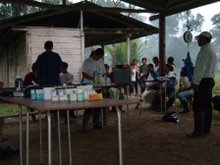Last night, after a week of studying for a couple of brutal national exams (whose sole purpose was evidently to convince us first-years that we still know nothing about medicine), I went to the Santa Ana armory to see patients with doctors, residents and other medical students. It was a good experience, as it made me reflect on my choice of profession more than anything else had in a long time.
First, some background: the armory is a seasonal night-time shelter in Santa Ana, California that runs only during the winter months. It opens its doors every evening around 6pm, and closes at 5am (the homeless are woken up at 4:30am to gather their belongings). It is located in a big warehouse stocked with 200+ four-by-six mattresses that accommodate its nightly patrons.
However, despite the lack of a kitchen, a child-care area, and other basic necessities of a shelter for people who have nothing (such as being open year-round, perhaps), the armory is generally well-run. It does its best to provide the services its clients need most: health care, legal aid, toiletries, and a hot meal.
My experience, of course, was in the clinic. MD's, DO's, residents, nurses, social workers and students are all part of the team providing care for 24-30 patients in a two hour time slot--no small feat. I've seen a lot of volunteer clinics, and this one worked well. Everyone had a role to play (even us first-years!) and things went fairly smoothly, the only worry (and it's a big one) being that homelessness is a disease too complex to cure in a twenty-minute visit. No matter how good a triage system you have.
I was paired with a family physician from Kaiser, a soft-spoken guy who (thankfully) was happy to have me around. He seemed like a natural teacher, and was eager to explain the intricacies of each case and field my endless string of questions. He was impressed that I knew what Barrett's esophagus was (he didn't know it might be the only thing I learned in histology) and that I was able to come up with differential diagnoses (even though much of the time, my differentials were longshots). In short, he was a kind man.
We saw several patients, and all of them reminded me of how my interests in literature, doctoring and people are the very reason I sit on my butt all day reading about the human body. I met an elderly German who shared his name with a film star from his country and chastised me for my poor geography. A Santa Ana native who came in for infected abscesses from heroine use and told us he spoke three languages: "English, Spanish and obscene." A jittery lady who "got out of prison on February 28th and lost all my teeth by the first of March." (I didn't ask how, despite wanting to know, because her chronic acid reflux was a much more pressing concern). "This homeless thing really gets in the way of eating properly and not stressing out," she told us. No kidding. We met a slight African American gentleman who hobbled into our station so fatigued he spoke in a whisper and had to rest on a cane. He was suffering from congestive heart failure, high blood pressure, peripheral neuropathy, and a really bad case of athlete's foot (which I noticed!). "Try to keep your feet as dry as possible, buddy," the doctor advised, despite all three of us knowing that his feet were the least of his worries. It was hard not to feel a little overwhelmed by the daily struggles the patients obviously face.
The night reminded me that everyone has a story. Not just homeless people, for that matter, but everyone. When we see standardized patients with our teachers and peers at school, or even when we practice interviewing with community doctors, I never get the feeling that I'm truly listening to a patient. I'm worried about whether my history-taking is orderly, or whether I'm asking all the right questions, or whether I'm projecting professionalism. But last night, in a real clinical setting, I felt more natural than ever before. And it didn't make me a worse clinician-in-training...in fact, I think it made me a better one. I was truly listening to the patients, trying to understand the evolution of their chief complaint from their point of view. Questions popped up in their logical progression; their answers led me down various paths. Some were right, others were clearly wrong. Either way, I felt a true connection with the patients, and I can't wait to volunteer again. Being a doctor is bearing witness to people's private life stories, and there is nothing I'd rather do than be the person who gets to hear them (and hopefully, one day, do something about it).
Friday, March 28, 2008
Subscribe to:
Comments (Atom)




